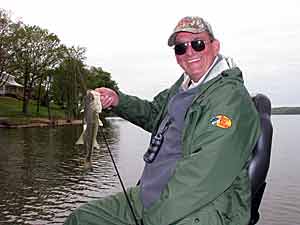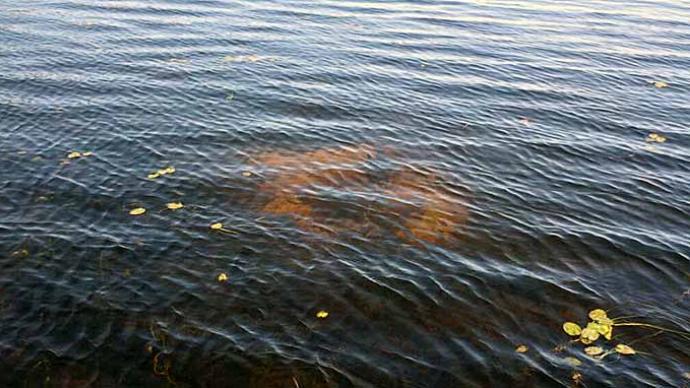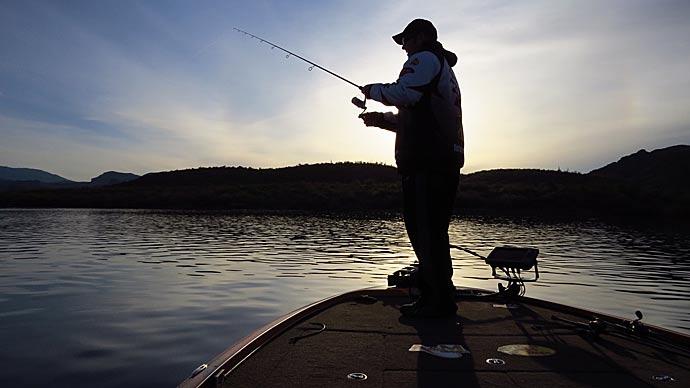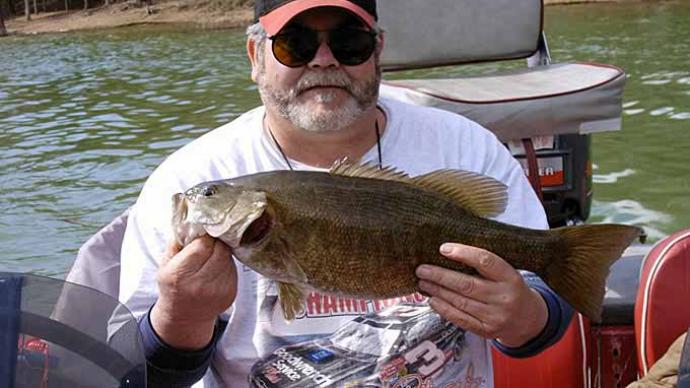
Your heart is beating so forcefully you can feel it in your throat. The adrenaline is pumping so hard that it gives you a tingling sensation through your entire body. Sweat is starting to trickle down your face. Now it's time to get down to business.
Sight fishing during the spawn can make your emotions work overtime. Just seeing that big spawning beauty is enough to drive any sane person crazy. When nothing else seems to work, drop into bed with them.
Drop shot fishing is not a typical sight fishing technique, but being typical doesn't make you a champion. To rise above your peers, often, you need to go against the grain.
Let's think about the basics of fishing during the spawn. First, you need a subtle presentation that can stay in the beds for a long time. In addition to simply staying in the bed, you need to have movement.
While a jig or a Texas rigged worm can fulfill your needs for a short time, after a minimal amount of moving, the bait is no longer in the strike zone. However, if you pitch a drop shot rig into a bed, you can move it for hours in the same spot.
Some creative anglers fish a drop shot on standard baitcasting equipment in the beds. This is another variation to the usual method of using this technique. You can now use 14+ pound test line and have a rod with enough backbone to get a good solid hook set.
It is not uncommon for the anglers using this technique to have hooks up to 2/0 in size on their lines. The increased hook size will allow much deeper penetration and more holding power.
Bait selection is a critical aspect of bed fishing. During the spawn, bass are not in the feeding mode. Their only priority is keeping predators out of the nests to prevent the eating of newly laid eggs. In a nutshell, what this means is that you must choose a bait that resembles a natural predator to the bass.
Bluegills and lizards are perfect bait selections for sight fishing. Both creatures in their natural environment are notorious for destroying thousands of bass eggs briefly. If you can pitch a bait that resembles tiny bluegill or lizard into a nest and keep it moving for an extended time, a bass will surely annihilate it.
When I fish a drop shot rig during the spawn, I prefer to use an MB704C rod from Rogue Rods. The rod has the right amount of stiffness to get a good solid hookset. My baits of choice are either a 3 3/4" curly tail drop shot minnow or a 5" salamander from Worminator Lures. The lifelike appearance and soft texture make these baits unbeatable. I always coat all of my baits with MegaStrike fish attractant because, in all conditions, it causes the bass to hold on longer, giving me more time to set the hook. I will use either a 1/0 or a 2/0 Daiichi hook most of the time. If you use an inferior hook, the lack of penetration will result in many missed fish. This particular combination works best for me in most spawning conditions that I encounter.
Using a stealthy approach will improve your odds, as with any method of sight fishing. Try to sneak up on the beds as quietly as possible. It would be best to do the same once a bass gets spooked and leaves the area. Move up the shoreline a short distance, trying to locate more bedding fish. Revisit your original area after you have allowed things to calm down because the bass will not vacate its nest for an overly extended period.
When zeroing in on your target, you should always aim for the backside of the nest. This will allow you to work the lure into position without spooking the fish slowly. Once perfectly aligned in your target zone, allow your bait to fall to the bottom. After a brief rest period, give the rod tip two to four quick twitches followed by a short pause. This will cause an erratic movement and allow the bait to descend into the nest. The beauty of the drop shot rig is that although you are moving the bait, your weight stays stationary. This will provide you with the ability to move your bait without leaving the crucial strike zone repeatedly.
The bass will get the impression that this predator is here to eat their eggs. Often it will not take too long before the bass decides to eliminate the threat.
You must be quick on the draw when setting the hook. Generally speaking, the bass has no intentions of eating your bait. It simply wants it gone. Therefore, the amount of time you will have to set the hook will be limited. Often, the fish will either carry the predator to an area outside the bed or try to crush it and spit it out. This is precisely why I mentioned coating baits with MegaStrike fish attractant, to give you a little more time to get a good hookset.
Keep in mind that every time you pull a fish off of its bed, you are opening the area up to potential predators. If you choose to fish bedding bass, try to release the fish as rapidly as possible. By doing so, you will help protect the fishery and allow other anglers the option of catching quality bass.




